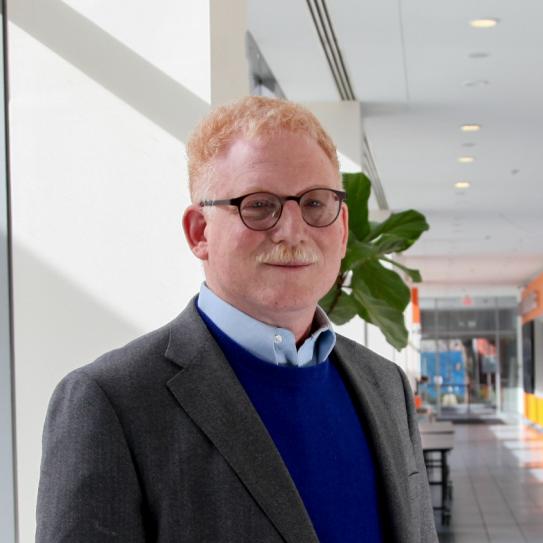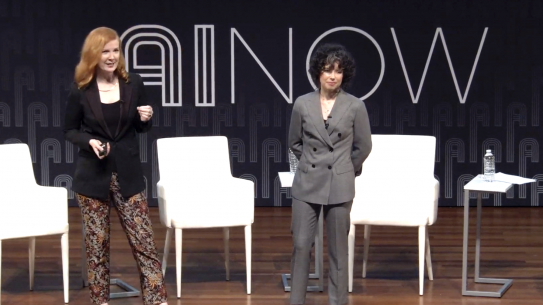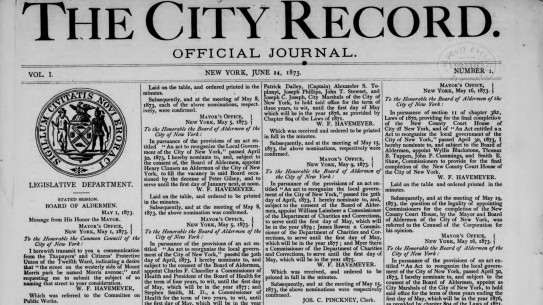
Education
Columbia College, Columbia University 1978
Bachelor of Arts,
Sturm College of Law, University of Denver 1982
Juris Doctor,
Columbia University 1992
Doctor of Philosophy, History
Publications
Journal Articles
“Ed Koch and Housing” catalog chapter, Museum of the City of New York exhibit on affordable housing, accepted and forthcoming, 2014.
“The Police versus the Policed: The Dilemmas of Freedom and Discipline in New York and London”
Journal of Urban History, Volume 38 Issue 4 July 2012 pp. 843 - 850.
“Modern Women Persuading Modern Men: The Nineteenth Amendment and the Movement for Woman Suffrage, 1916–1920” History Now (Gilder Lehrman Institute of American History) Issue 30, January 2012.
“Mayor Edward I. Koch and New York’s Municipal Foreign Policy” in Shane Ewen and Pierre Yves Saunier, eds. Another Global City. Transnational Municipal Trails in the Modern Age (1850-2000) (New York: Palgrave, 2008), 119-34.
“All Politics are Global: Nineteenth Century New York History in its Own World Wide Web” Urban History 32.2 ( Cambridge UP, 2005).
“The National Association of Manufacturers and the Militarization of American Conservatism, 1950-1975,” Business History Review, 75 (Winter 2001): 775-805.
“Bleaching the Lily: Robert A. Taft, Barry Goldwater and Republican Southern Strategies, 1940-64” in Jürgen Heideking, Jörg Helbig, and Anke Ortlepp, eds., The Sixties Revisited: Culture, Society, Politics, American Studies Monograph Series (Heidelberg: Universitätsverlag C. Winter, 2001), 487-502. A study of the Republican Party’s southern strategies since 1940, and the increased racial polarization of the party system since Goldwater’s 1964 campaign.
“Ammonia” Public 19/20: Lexicon vol. 1 & 2 (Winter/Spring 2000).
An essay based on a family story about Nobel laureate Fritz Haber, inventor of synthetic ammonia and chemical warfare.
“All for One or One for One: The U.N. Military Staff Committee and the Contradictions of American Internationalism.” Diplomatic History, vol. 21 no. 1 (Winter 1997), 45-69. A study of the original negotiations to establish combat-ready UN military forces in 1946-48, arguing that the deliberate vagueness of the charter, as much as Cold War tensions, prevented agreement on the creation of a permanent international military force under the auspices of the UN.
“Oral History and American Foreign Policy.” Journal of American History, v. 82, no. 2 (Sept. 1995), 607-16. Historians of American foreign relations, who could find more uses for oral history texts if they read them in new ways, have underutilized oral history.
Authored/Edited Books
Monetizing the Masses: Tammany Hall and the Business of New York's Infrastructure (under contract to the University of Chicago Press). “Ever heard that business is business? Well so is politics,” Tammany Boss Richard Croker once declared. An anti-corruption investigator asked him under oath if he was “working for his own pocket.” He responded “All the time, and you too.” A former pugilist who aspired to be an English country squire, Croker accurately expressed the capitalist spirit of his organization, Tammany Hall. With varying degrees of efficiency throughout its history, Tammany specialized in turning votes into cash, a business tolerated by the city’s elite so long as the Democracy kept a lid on the working class. By characterizing themselves as businessmen, Tammany politicians dissolved the imaginary line between the public interest and the private interests they represented, but they also described their role as officers in a business, the Tammany Society, incorporated by the New York State legislature in 1809, and nearly bankrupted in 1943. The story of Tammany wealth is intimately tied to the story of the city’s infrastructure. When it held sway, every sewer pipe, every streetlight, every streetcar made money for someone in Tammany Hall. Nonetheless, Tammany’s stance on “progress” did not always take predictable forms. No history to date has systematically examined the relationship between Tammany and infrastructure development over the course of the city’s history, an inquiry central to understanding how it functioned as a business network of upwardly mobile politicians. Infrastructure projects increased the value of their private real estate holdings, and supplied Tammany with patronage jobs for contractors and workers whose salary kickbacks and “volunteering” to get out the vote were the lifeblood of Tammany power. Especially in hard times, infrastructure jobs also helped Tammany Democrats contain conflict between the city’s bourgeoisie and its impoverished working class.
Ed Koch and the Rebuilding of New York City (Columbia University Press, 2010) .
A history of New York in the 1970s and 1980s. It tells the story of the larger-than-life mayor who led the Big Apple back from the brink of bankruptcy in the 1970s and 1980s. Koch had inherited a city declining in population and wealth in a country where politics was increasingly dominated by conservative suburbanites. Arsonists destroyed so many buildings that one neighborhood in the Bronx was even used as a film location for the firebombing of Dresden. But Koch’s New York Koch—with bistros springing up along Columbus Avenue, Wall Street growing fat on junk bonds, and rental housing converting to condos—became a place that was growing rather than shrinking during his twelve years in office.
For better or worse, Koch convinced many New Yorkers to embrace a new political order that subsidized business and privatized public space. Faced with the need to promote economic growth, the Koch administration made difficult choices between moneyed interests and New York’s social democratic tradition, forcing Koch to be both moderate and pragmatic, mitigating the increasing economic inequalities while subsidizing an ostensibly laissez-faire system. Some of Koch's rhetoric and decisions increased racial tensions. Homelessness, crime, and AIDS increased, especially in his third term. His administration was tainted by scandals. But he bravely faced one of the worst financial crises in the city’s history. After restoring the city’s credit, he repaired a damaged urban fabric, rebuilding neighborhoods and infrastructure devastated by arson and disinvestment, and with minimal help from an anti-urban federal government. The first book to recast Koch’s legacy through personal and mayoral papers, and authorized interviews, this volume resolves the issue of Koch’s impact through a detailed account of his administration’s politics and policies.
General Matthew B. Ridgway: From Progressivism to Reaganism 1895-1993. (Westport, CT.: Praeger, 1998).
Other Publications
REVIEWS, SERVICE AND MISCELLANEOUS PUBLICATIONS
Urban History Association 2014 Program Committee for Biennial Meeting Phildelphia, Oct. 2014.
Urban History Association, 2014 Chair, Prize Committee for the Kenneth T. Jackson Prize for best book in North American Urban History.
Urban History Association, 2010 Prize Committee for best article in the field published in 2009.
Review of Beverly Gage, The Day Wall Street Exploded: A Story of America in its First Age of Terror (Oxford UP, 2009) for Business History Review forthcoming Summer 2010.
Review of Bruce J. Schulman and Julian Zelizer, eds., Rightward Bound: Making America Conservative in the 1970s (Cambridge: Harvard UP, 2008) Journal of American History, Volume 95, no. 3 (December 2008), 928-9.
Manuscript review, Max Page, The City’s End: Two Centuries of Fantasies, Fears, and Premonitions of New York’s Destruction (New Haven: Yale University Press, 2008).
Review of Eli Lederhendler, New York Jews and the Decline of Urban Ethnicity, 1950-1970 (Syracuse, N.Y.: Syracuse UP, 2001) and Wendell Pritchett, Brownsville Brooklyn: Blacks, Jews, and the Changing Face of the Ghetto (Chicago: U. of Chicago Press, 2002) Urban History, Volume 30, Issue 03, Dec 2003, pp 436-439.
“Reform Democratic Clubs” in Peter Eisenstadt, ed. The Encyclopedia of New York State (Syracuse: Syracuse University Press, 2005).
Referee for the David Thelen Prize Committee, Organization of American Historians, prize for the translation and publication of the best foreign article on American history in the Journal of American History, 2002.
Review of Rick Perlstein, Before the Storm: Barry Goldwater and the Unmaking of the American Consensus (New York: Hill & Wang, 2001) for H-POL, H-NET, July 20, 2001.
“Matthew B. Ridgway” in Kenneth T. Jackson, ed. The Scribner’s Encyclopedia of American Lives.v. 3 (New York: Scribners, 2001).
Review of William Stueck, The Korean War: An International History (Princeton: Princeton UP, 1995), Bulletin of Concerned Asian Scholars, vol. 28 nos. 3&4 (1996).
Review of Barbara Epstein, Political Protest and Cultural Revolution: Nonviolent Direct Action (Berkeley: UC Press, 1990) in The Oral History Review, 19:1&2 (Spring/Fall, 1991), 136-37.
Contributing Editor, The Court TV Cradle to Grave Legal Survival Guide. (Boston: Little, Brown, 1995).
Affiliations
American Historical Association, Organization of American Historians, Urban History Association
Awards
- Fellow, New York Academy of History, elected 2012.
- Gilder Lehrman Foundation Fellow, 2011-12
- Board Member, Urban History Association, 2012




